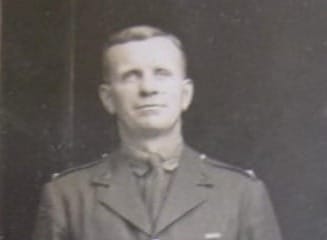Boot Camp for Seniors
Edgar Whitehead reported to Ramsgate on March 16, 1940, and started to learn a new profession. After being a Member of Parliament it was like being suddenly sent back to a boarding school.

Sleeping in dormitories, being chased about the parade ground by the Sergeant Major, working at school desks, and eating what reminded him forcibly of school food, seemed to roll back time by nearly twenty years.
The course was very intensive and crowded into a matter of weeks what, in normal times, would have taken about six months, but the keenness was intense and universal. Those from the O.E.R. were all over thirty-five years old, including many veterans of WWI. One Officer in particular had both the D.S.O. and M.C. when he had been a temporary soldier. The average age was above rather than below forty. They were formed into a separate unit within the Pre-Officer Cadet Training Unit (O.C.T.U.). The remainder were made up of young cadets chosen largely from regular units serving in France.
All in Edgar's unit had held responsible positions before the war broke out and having cast aside all their responsibilities on joining the army, were in a very light-hearted mood. The course was held in a commandeered school and the actual school classrooms were used for the lectures. Everyone was affected by the school atmosphere. Edgar counted no fewer than four officers carving their initials on their desks the very first morning.
The Army made a mistake, sending a young Subaltern who had just finished Sandhurst to lecture the new recruits. It was soon evident he would never be able to keep order. Edgar's friend, the last war veteran, who had a very large mustache and looked every day of his forty-five years, opened the proceedings after five minutes by holding up his hand. When asked by the youthful lecturer what he wanted, he said "Please teacher may I leave the room?" The first lectures were somewhat of a farce. The Administration quickly corrected this. A grey-haired major of the Army Educational Corps who would not stand any nonsense from anybody soon replaced him.
The practical work was extremely well organized although at the beginning it was clear that some of those straight from civilian life were not fit and some were substantially overweight. However, as the days went by they became progressively more efficient. The Sergeant Major invariably referred to their platoon as the Chelsea Pensioners.
Ideas of age vary between war and peace. Throughout the five years of his army career everybody regarded Edgar's 'old' age as a joke. But once demobilized and returned to politics he found himself regarded as a very young man. His experience in the Army showed that maximum efficiency declined after the age of thirty-five. Edgar believed this was true in civilian life too--too many old men clinging to positions of authority in the civil service in particular.
At the end of the course at Ramsgate, Edgar got ninety-three percent on the written examinations with a recommendation for staff duties. On the practical side he was given a rather awkward squad to drill. In his years at Witchwood he had found it a labor saving device to give instructions to his African staff from the opposite side of a mountain valley which had developed the power of his lungs. He used them to the full on this occasion. When he finally stood his squad easy and reported to the inspecting officer, he said, "Mr. Whitehead, you certainly know your words of command, but please remember that Prussian methods are not encouraged in the modern British Army."
Edgar had a beer with the Sergeant Major that evening who took a different view. "Whitehead, you'll do all right, you'll put the fear of God into them Militia."
The historical novel Whitewashed Jacarandas and its sequel Full of Possibilities are both available on Amazon as paperbacks and eBooks.
These books are inspired by Diana's family's experiences in small town Southern Rhodesia after WWII.
Dr. Sunny Rubenstein and his Gentile wife, Mavourneen, along with various town characters lay bare the racial arrogance of the times, paternalistic idealism, Zionist fervor and anti-Semitism, the proper place of a wife, modernization versus hard-won ways of doing things, and treatment of endemic disease versus investment in public health. It's a roller coaster read.
References:
- Sir Edgar Whitehead's Unpublished Memoirs, Rhodes House, Bodleian Library, Oxford University, by permission.
- Photo Credit: Kind permission of Mrs. Rachael Clarkson, (niece of Sir Edgar Whitehead.)

